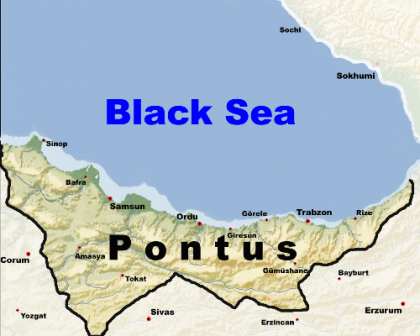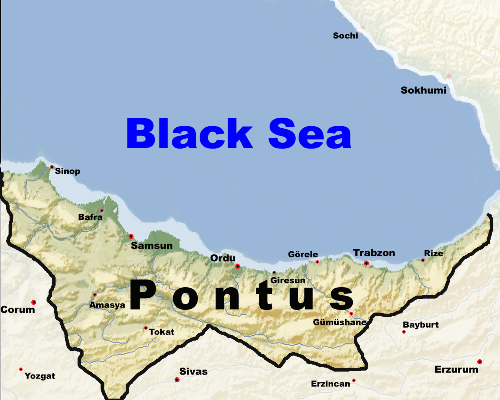
 By Ani Avetyan
By Ani Avetyan
Azad-Hye Special
Mustafa Kemal Ataturk has laid the foundation of modern Turkey, but at the same time he was also involved in series of genocidal acts throughout Turkey. This fact is almost ignored in Turkey after generations of official distortion of history. Many 24 April commemoration days have passed without Turkish recognition. The same applies to 19 May, the day dedicated to the martyrs of the Pontian Greek Genocide, which has been acknowledged by the Greek Parliament in 1994.
After the destruction of Constantinople, Pontus remained the last part of Byzantine Empire which fell to the Turks. The occupation of Trebizond saw the end of Greek freedom. Until a century ago some 700 thousand Greeks were living under Ottoman rule in that ancient part of Pontus.
With the advent of WWI, the Young Turks planed and implemented their policy of exterminating non-Turkish elements from the Ottoman Empire. Ambassador of Greece to Armenia Antonios Vlavianos says on this occasion: “The sufferings of Pontian Greeks started with the WWI. Until 1923 about 353,000 people were massacred, equaling to the half of the Pontian population. 1,134 churches and 960 schools were erased. Armenia, which suffered one and half million loses, welcomed the survivors from Pontus”.
Zarik Zakharov, an Armenian who was married at age 18 to a survivor of the Pontian Genocide says: “Turks killed both Armenians and Pontians and after that they addressed the world as if nothing has happened”. Answering to a question about the possibility of any discrimination against Greeks in Armenia, Simon Zakharov, Head of the Greek community in the north-western Armenian town of Alaverdi, says “Absolutely no. Armenia is our home”.
Edward Sharmazanov, an Armenian parliamentarian of ethnic Greek origin explains the reason behind celebrating 19 May as day of Pontian Genocide. “On 19 May 1919, Mustafa Kemal Ataturk called upon the Turkish nation to cleanse Turkey from the Greeks”.
The Genocide of the Pontian Greeks has not been widely publicized. Until today only three countries: Greece, Cyprus and Sweden have recognized it. Arkady Khitarov, Head of the Greek community in Armenia explains: “The Armenian Genocide is seen on state level here in Armenia, but the case is different in Greece. Unfortunately those who are actively involved in propagating Pontian Greek Genocide are only the descendants of the Pontian Greeks. The strongest movements are recorded in the USA, Australia and Europe”, he concludes.
Eventually a murder cannot be dropped by time. The perpetrators of the Genocide should at least apologize.
TEXT IN ARMENIAN
Ու դեռ քանի ցեղասպանություն է լինելու?
Անի Ավետյան
Ազատ-Հայ կայքին հատուկ
Քեմալ Աթաթուրքն այսօրվա Թուրքիայի հիմքն է, նաև Թուրքիայի տարածքում իրագործված ցեղասպանությունների հեղինակն ու կարգադրիչը: Թուրքիայում դարեր շարունակ պատմություն է հորինվում ու հրամցվում արդեն մի քանի սերնդի: Դժվար է նրանցից ուրիշ վերաբերմունք ակնկալել: Ու այնուամենայնիվ, ապրիլի 24-երը շարունակում են անցնել, անցնում են նաև մայիսի 19-երը: Մայիսի 19-ը Պոնտոսի հույների ցեղասպանության հիշատակի օրն է /ընդունել է Հունաստանի խորհրդարանը, 1994 թվականին/:
Կոստանդնուպոլսի ավերումից հետո Պոնտոսը Բյուզանդական կայսրության վերջին տարածքն էր, որ ընկավ թուրքերի ձեռքը: Տրապիզոնի գրավումը հույների համար դարձավ ազատության վերջը: Դեռ 100 տարի առաջ մոտ 700.000 հույն շարունակում էր ապրել Օսմանյան կայսրության լծի տակ:
Առաջին համաշխարհային պատերազմի հետ սկսվեց նաև երիտթուրքերի` ?ոչնչացնել քրիստոնեական և ոչ թուրքական ցանկացած հետք Թուրքիայում? քաղաքականությունը:
?Պոնտոսի հույների առաջին հալածանքները ևս սկսվեցին առաջին համաշխարհային պատերազմի հետ: Մինչև 1923 թվականը կոտորվեց 353.000 մարդ, այսինքն` պոնտացիների կեսը: Ամբողջությամբ ոչնչացվեցին մինչև այդ գործող 1134 եկեղեցի և 960 դպրոց : 1915 թվականին 1.500.000 միլիոն զավակ կորցրած Հայաստանը գրկաբաց ընդունեց փրկվածներին?, – նշում է Հայաստանում Հունաստանի արտակարգ և լիազոր դեսպան Անտոնինոս Վլավիանոսը:
Տիկին Զարիկ Զախարովն ասում է ինքը 18 տարի հայ էր, հետո Պոնտոսի կոտորածներից փրկվածների հետնորդի հետ ամուսնացավ ու արդեն 54 տարի է հույն է. ?Թուրքերը հույներին էլ ջարդեցին, հայերին էլ ու վերջում իրենք էլ լավամարդ դուրս եկան?:
Ալավերդու հունական համայնքի ղեկավար Սիմոն Զախարովն է վստահեցնում. Հայաստանում հույների հանդեպ խտրականություն չկա. ?Ոչ, միանշանակ ոչ, Հայաստանը մեր հայրենիքն է?:
Ամեն տարի Պոնտոսի հույների հիշատակի օրը հենց մայիսի 19-ինն է: Բացատրում է ՀՀ Ազգային ժողովի հունական ծագումով պատգամավոր Էդուարդ Շարմազանովը. ?Որովհետև 1919 թվականի մայիսի 19-ին Մուստաֆա Քեմալ Աթաթուրքը կոչ արեց թուրք ազգաբնակչությանը Թուրքիան մաքրել հույներից?:
Հույների ցեղասպանության ճանաչումը մեծ հաջողություններ չի գրանցել: Միայն երեք երկիր` Հունաստանը, Կիպրոսն ու Շվեդիան են ճանաչել: Հայաստանում հունական համայնքի ղեկավար Արկադի Խիտարովը պարզաբանում է. ?Եթե Հայաստանում հայոց ցեղասպանությունը պետական մակարդակով է դիտվում, ապա Հունաստանում, ցավոք սրտի, այդպես չէ: Ցեղասպանության հարցը բարձրացնողները միայն Պոնտոսի հույների հետնորդներն են: Ամենահզոր պոնտական միջազգային շարժումները Միացյալ Նահանգներում են, Ավստրալիայում և Եվրոպայում?:
Այնուամենայնիվ ոճրագործությունը տարիներ, ժամանակ չի ճանաչում, ոճրագործության հեղինակները գոնե ներողություն պիտի խնդրեն:
